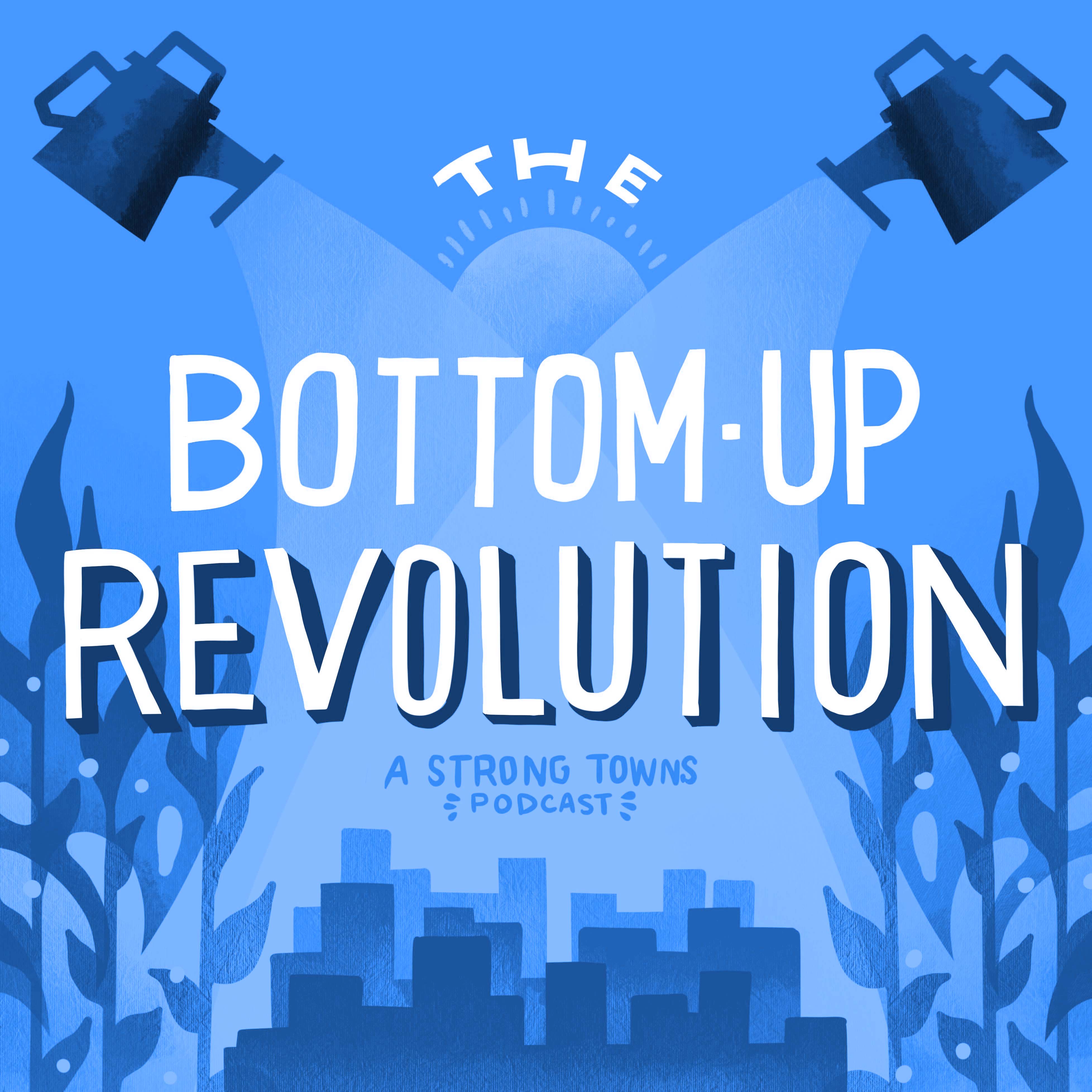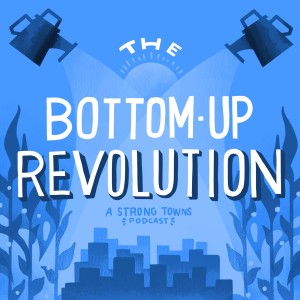
562K
Downloads
301
Episodes
The Bottom-Up Revolution features the stories of the Strong Towns movement in action. Hosted by Tiffany Owens Reed and Norm Van Eeden Petersman, it's all about how regular people have stepped up to make their communities more economically resilient, and how others can implement these ideas in their own places. We’ll talk about taking concrete action steps, connecting with fellow advocates to build power, and surviving the bumps along the way—all in the pursuit of creating stronger towns. Each episode features a Strong Towns advocate who is making positive change in their community.
Episodes

Thursday Nov 21, 2024
The Bottom-Up Revolution Is…Reclaiming Forgotten Spaces for the Community
Thursday Nov 21, 2024
Thursday Nov 21, 2024
Katy Clagett is a commercial real estate appraiser, but at her core, she’s an urban explorer and champion for overlooked spaces. At this year’s National Gathering, she won the Small Bets Competition for her “Flock Party” pitch of reclaiming a neighborhood alley using sheep and goats.
Clagett joins this episode of The Bottom-Up Revolution to talk about the ways bottom-up projects can bring neighbors together and build community, as well as her experience with spearheading this kind of project.
ADDITIONAL SHOW NOTES
-
Local recommendations:
-
Do you know someone who would make for a great The Bottom-Up Revolution guest? Let us know here!

Tuesday Nov 19, 2024
Bottom-Up Shorts: How $6 Can Make a Community More Bikeable
Tuesday Nov 19, 2024
Tuesday Nov 19, 2024
In this episode of Bottom-Up Shorts, host Norm Van Eeden Petersman is joined by Sarah, the leader of Strong Towns Poway/Rancho Bernardo, a Local Conversations group. Sarah and several of her friends teamed up to install bike racks in places that were lacking them. Here’s how they used a really small budget and lots of determination to make something good happen in their community.
ADDITIONAL SHOW NOTES
-
Do you know someone who would make for a great The Bottom-Up Revolution guest? Let us know here!

Thursday Nov 14, 2024
Bottom-Up Shorts: How Stickers Can Help You Build a Strong Town
Thursday Nov 14, 2024
Thursday Nov 14, 2024
This Member Week, we’re excited to introduce you to Bottom-Up Shorts, a new collection of 10-minute episodes that we're adding to The Bottom-Up Revolution feed. Each week, Member Advocate Norm Van Eeden Petersman will talk with inspiring guests who are taking action in their community.
This week, he’s joined by Manav Sharma, one of the leaders of Strong Towns Vancouver, a Local Conversations group. Sharma and his group were inspired to make their community stronger through the tactical deployment of stickers. Here’s how they’re doing it.
ADDITIONAL SHOW NOTES
-
Strong Towns Vancouver sticker campaign coverage, pictures and video.
-
Do you know someone who would make for a great The Bottom-Up Revolution guest? Let us know here!

Thursday Oct 31, 2024
The Bottom-Up Revolution Is…Building the Future With Wisdom From the Past
Thursday Oct 31, 2024
Thursday Oct 31, 2024
Rik Adamski is the founder and president of Ash+Lime, a planning firm that strives to help cities and neighborhoods create thriving places by drawing on the wisdom of the past. Originally from Chicago, Adamski consulted for several of the most prominent planning organizations in the U.S. before moving to Texas and embracing a more nimble, actionable and participatory approach to developing communities.
In this episode of The Bottom-Up Revolution, Adamski joins host Tiffany Owens Reed to discuss his approach to urban planning, the challenges of implementing a new planning approach in cities, and the importance of community engagement and incrementalism.
ADDITIONAL SHOW NOTES
-
Local recommendations:
-
Ten Bells Tavern (reopening soon).
-
Jefferson Boulevard.
-
Stockyards District in Fort Worth.
-
-
Ash+Lime (website).
-
Do you know someone who would make for a great The Bottom-Up Revolution guest? Let us know here!

Thursday Oct 24, 2024
The Bottom-Up Revolution Is...Building and Amplifying Communities
Thursday Oct 24, 2024
Thursday Oct 24, 2024
Norm Van Eeden Petersman is the director of membership and development at Strong Towns. He regularly writes for Strong Towns on topics including housing, transportation and community building. He also co-leads his area’s Local Conversation, Deltans for People-Oriented Places.
In this episode, Petersman joins host Tiffany Owens Reed to discuss his work with Strong Towns and the importance of building community in your place. They also share an exciting update about the future of The Bottom-Up Revolution.
ADDITIONAL SHOW NOTES
-
Local Recommendations:
-
Do you know someone who would make for a great The Bottom-Up Revolution guest? Let us know here!

Thursday Oct 17, 2024
The Bottom-Up Revolution Is...Advocating for Safer Streets
Thursday Oct 17, 2024
Thursday Oct 17, 2024
Yamini Karandikar is the leader of Strong Towns San Antonio, a Local Conversation in Texas that advocates for safer streets and alternative transportation. Among other efforts, she successfully nominated an intersection in her city for review in the Strong Towns Crash Analysis Studio and is co-hosting a Local-Motive session on improving street safety. Professionally, she works in process improvement strategy within the electric and gas industry.
In this episode of The Bottom-Up Revolution, Karandikar talks with host Tiffany Owens Reed about her advocacy journey, what it’s like to conduct a Crash Analysis Studio, and how her community is changing for the better.
If you want more information about Karandikar’s experience with the Crash Analysis Studio and how it’s transforming her community, join her Local-Motive session on October 24 at noon CDT: “From Crash to Community Empowerment: How Addressing a Car Crash Helped Save and Change Lives.”
ADDITIONAL SHOW NOTES
-
Local recommendations:
-
Do you know someone who would make for a great The Bottom-Up Revolution guest? Let us know here!

Thursday Oct 10, 2024
The Bottom-Up Revolution Is…Putting Down Roots To Build a Stronger Future
Thursday Oct 10, 2024
Thursday Oct 10, 2024
Jacob Hyman is a civil-site engineer in training and the leader of Strong Towns Steubenville, a Local Conversation in Ohio. Originally from Florida, he moved to Steubenville after serving in the Air Force and started the city's Local Conversation two years later. He works for Crabtree Group, Inc., which provides site engineering services for traditional neighborhood developments and infill development across the country and globe.
Today, Hyman joins host Tiffany Owens Reed on The Bottom-Up Revolution to discuss the challenges of revitalizing a Rust Belt city, how Strong Towns Steubenville is tackling those challenges, and how a combination of creativity, community and faith could be exactly what Steubenville — and cities like it — need to thrive.
ADDITIONAL SHOW NOTES
-
Local recommendations:
-
Do you know someone who would make for a great The Bottom-Up Revolution guest? Let us know here!

Thursday Sep 26, 2024
The Bottom-Up Revolution Is…Becoming a Local Real Estate Developer
Thursday Sep 26, 2024
Thursday Sep 26, 2024
Tiffany Elder is a licensed general contractor, realtor and real estate investor/developer in Durham, North Carolina. She is the owner of Paradigm Construction (a design-build construction firm) and Paradigm Properties (a real estate brokerage firm). She also facilitates real estate ownership and investing seminars for residents.
Elder joins this episode of The Bottom-Up Revolution to discuss her career path, how her various roles intersect, and the challenges and opportunities she’s faced in Durham.
To hear more from Elder, check out her Local-Motive session “Investing in Housing Development that Strengthens Neighborhoods Without Pushing People Out.” You can join live today at noon CDT or access the recording at any time in the Strong Towns Academy.
ADDITIONAL SHOW NOTES
-
Local recommendations:
-
Walk downtown.
-
Duke Gardens.
-
Do you know someone who would make for a great The Bottom-Up Revolution guest? Let us know here!

Thursday Sep 19, 2024
The Bottom-Up Revolution Is…Helping Incremental Developers Make Better Places Part 2
Thursday Sep 19, 2024
Thursday Sep 19, 2024
Jennifer Krouse is a real estate strategist and the CEO of Liberty House Plans, an architectural publishing house that provides architectural plans for neighborhood-friendly buildings. Previously, she served as a business advisor to real estate developers and a consultant in the field of municipal productivity. She is a member of the National Town Builders Association and holds a BA from Williams College and an MBA from the Stockholm School of Economics.
Krouse returns in this episode of The Bottom-Up Revolution to dive deeper into what it means for an area to be productive. She and host Tiffany Owens Reed also discuss the importance of social capital and smart municipal investment strategies.
ADDITIONAL SHOW NOTES
-
Local recommendations:
-
Do you know someone who would make for a great Bottom-Up Revolution guest? Let us know here!

Thursday Sep 05, 2024
The Bottom-Up Revolution Is…a City Council Supporting Parking Reform
Thursday Sep 05, 2024
Thursday Sep 05, 2024
Paloma Delgadillo is a council member in the city of Broomfield, Colorado. Originally from Texas, Paloma holds a B.A. in economics and a minor in statistics from the University of Chicago undergraduate program. She also earned a master’s degree in analytics from the University of Chicago Graham School.
In this episode of The Bottom-Up Revolution, Delgadillo joins host Tiffany Owens Reed to discuss her efforts to make her city more resilient, including through parking reform.
To hear more from Delgadillo, sign up for next week’s Local-Motive session: “The Parking Revolution is Here. Is Your Community Ready To Sign On?”
ADDITIONAL SHOW NOTES
-
Local recommendations:
-
Do you know someone who would make for a great The Bottom-Up Revolution guest? Let us know here!
